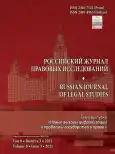The Activity of Lawyers in the International Criminal Court: Theoretical and Practical Aspects
- Authors: Sedova D.A.1
-
Affiliations:
- Russian University of Justice (RPA of the Ministry of Justice of Russia)
- Issue: Vol 8, No 3 (2021)
- Pages: 67-72
- Section: International law
- URL: https://journal-vniispk.ru/2410-7522/article/view/79723
- DOI: https://doi.org/10.17816/RJLS79723
- ID: 79723
Cite item
Abstract
In the entire history of mankind, a large number of acts of violence and aggression have been committed. Over the past 50 years alone, there have been more than 400 interstate and intrastate conflicts that have claimed the lives of millions of people. Increasingly, there has been an urgent need to protect the violated rights of individuals. The idea of creating a single international body for the protection of human rights has been discussed more than once. For the first time, the idea of creating an international judicial body was expressed in 1948 by the UN General Assembly after the Nuremberg and Tokyo trials at the end of World War II, which issue has been discussed at the United Nations ever since. However, efforts to create such a mechanism have not been successful, despite the need for a permanent criminal court to prosecute and punish those who commit the most serious crimes. In 1998, this idea was realized. The International Criminal Court (ICC) has sought ways to establish a world order with a fair resolution of conflicts. “It has long been recognized,” the verdict of the Nuremberg Tribunal noted, “that international law imposes duties and obligations on specific individuals as well as on the state. […] Crimes against international law are committed by people, not by abstract categories, and only by punishing individuals who commit such crimes can the provisions of international law be respected.” To date, the ICC is successfully coping with the task of punishing those persons or groups of persons who have committed the international crimes listed in the Rome Statute. It would seem that the balance between good and evil has been found. The crime has been committed and the criminal punished. But it is important to note that the procedural issues have not been resolved as well as that of punishing criminals. An urgent matter today is the status of defenders of the accused in international criminal proceedings. This question requires not only a doctrinal, but also a practical understanding.
Full Text
##article.viewOnOriginalSite##About the authors
Daria A. Sedova
Russian University of Justice (RPA of the Ministry of Justice of Russia)
Author for correspondence.
Email: darya.sedowa@yandex.ru
SPIN-code: 9415-1484
bachelor of law
Russian Federation, MoscowReferences
- Pechegin DA. The problem of combining adversarial and investigative principles in criminal proceedings: finding a solution on the example of the International Criminal Court. Zakonodatelstvo. 2015;(2):69–77. (In Russ.).
- Pechegin DA. The ratio of investigative and adversarial principles in international documents regulating criminal proceedings. Bulletin of the Moscow University. Episode 11: Law. 2014;(6):50–59. (In Russ.).
- Broomhall B. International justice and the International Criminal Court: between sovereignty and the rule of law. Oxford, 2003. P. 93–101.
- Volevodz AG. Modern system of international criminal justice: concept, legal bases, structure and features. International criminal justice: Modern problems. 2009. P. 303–323. (In Russ.).
- Vladimiroff M. Arguments about the status of a defender in international court proceedings. Access mode: https://academia.ilpp.ru/wp-content/uploads/2019/11/%D0%9C%D0%9F3-4-2012_%D0%92%D0%BB%D0%B0%D0%B4%D0%B8%D0%BC%D0%B8%D1%80%D0%BE%D1%84%D1%84.pdf. (In Russ.).
- Glotova SV. The International Criminal Court in the system of international security. International Law – International Law. 2007;1(29):85–99. (In Russ.).
Supplementary files







